PROJECTS
2019.- GREEN LIBRARY (partner)
2023.-2026. EUKI - LANDCARE EUROPE CAPTURES CARBON (partner)
2024.-2025. (CATALYST FOR CHANGE)(partner)
2020.-2022. JEKA! STRENGTHENING ECO-ACTIVISM FOR URGENT CLIMATE ACTION (partner)
2018.-2020. WETLANDS FOR LIFE - EURONATUR 2
2018.-2020. INNOVATIVE MINDS FOR SMART SCHOOLS (partner)
2018.-2020. WETLANDS FOR LIFE - EURONATUR 1
2015.-2016. LAST CHANCE FOR PODOLIAN CATTLE – EURONATUR
2014.-2016. SAVA FLOODPLAIN - WHERE NATURE MEETS CULTURE (partner)
2014.-2015. TOGETHER FOR COMMON PASTURES - GLOBAL GREEN FUND
2013. THE RIGHT TO A CITIZENS ' INITIATIVE – HOW CAN WE INFLUENCE PUBLIC POLICY IN THE EU?
2012.-2013. STAN ON GAJNA(partner)
2011.-2012. NATURA 2000 - NETWORK OF PROTECTED AREAS IN EU
2011.-2012. JAVNE POLITIKE DUGOG DOMETA: ZEMLJA - VODA – ZRAK (partner)
2010. CREATION OF THE PREREQUISITES FOR THE PERMANENT PROTECTION OF THE PODOLIAN CATTLE (partner)
2010.-2011. „FIGHTING AGAINST INVASIVE PLANTS“
2010.-2011. „WE LOVE AND PROTECT OUR HERITAGE“
2010.-2012. BUILDING ANTI FLOODING ELEVATION AND RECONSTRUCTING DAM ON LATERAL CANAL
2004.-2006. TRADITIONAL CONSTRUCTION – WOODEN STABLE ON GAJNA
2006. "PROTECTION OF BIOLOGICAL DIVERSITY IN SAVA RIVER INUNDATIONS IN BROD POSAVINA COUNTY"
2005. "PROTECTION OF DANUBE BASIN, WEST LATRAL CANAL BASIN"
1999. LEAFLET GAJNA – PROTECTED LANDSCAPE
1997. RECONSTRUCTION OF TRADITIONAL GUARDING TOWER (ČARDAK)
1997. REKONSTRUCTION OF TRADITIONAL WELL(ĐERAM SA STUMBULOM)
1996. BROCHURE – WALKING PATH GAJNA
1995.-1996. "PROTECTION OF WEST LATERAL CANAL BASIN"
1995.-2000. INTERNATIONAL COASTAL CLEANUP
1994.-1995. "GAJNA IN SCHOOL – PROTECTION OF THE SITE IN IDEA AND PRACTICE"
1988. DREDGING AND FENCING BIG GAJNA
The Brod Ecological Society (BED) and the Slavonski Brod City Library (GKSB) opened the Green Library on Thursday, May 16, 2019, on the occasion of the Day of the City of Slavonski Brod and 30 years of BED's work, in the premises of the GKSB. As an introduction, Iris Beneš, BED program coordinator and Green Forum representative in the Rural Development Program Monitoring Committee, held the training "Agriculture that protects nature". The training was intended for members of the network for environmental and nature protection in the Republic of Croatia, the Green Forum, but was also open to interested citizens. The training is part of a two-day program in which environmental associations from all over the Republic of Croatia will receive more information about the agri-environmental program in the Rural Development Program of the Republic of Croatia 2014-2020 and about the Common Agricultural Policy, and is supported by funds from the Rural Development Network. The Green Library is a project started in 2011 on the occasion of the International Year of Biological Diversity with the aim of educating the public and raising awareness about a sustainable society and the necessity of environmental protection. Through the national campaign "Let's Start Green Libraries", libraries and library societies are trying to raise public awareness about the importance of preserving our only habitat - planet Earth. As one of the initiators of Green Libraries, Ivan Kraljević from the Istrian Librarians' Association was present at the event, who gave a presentation on previous experiences, showed inspiring examples, and emphasized the motto under which the program operates - "Let's not waste it, good planets are hard to find". The director of the GKSB Ružica Bobovečki expressed her desire for increased library activity in this field and thanked the Brod Ecological Society and all associations and institutions that helped establish this green corner with their materials. Iris Beneš emphasized that the Green Library project is not just a physical space, but a broader space of cooperation and a channel through which information about environmental protection, nature and sustainable development will more easily reach a wider audience.
The almost 2.5-year project supported by EUKI called "LANDCARE EUROPE Captures Carbon - Supporting Natural Climate Protection in Agricultural Landscapes" was launched in November 2023. The project is coordinated by the German Landcare association for land care "Deutscher Verband für Landschaftspflege" (DVL) in cooperation with four implementing partners: Brodsko ekološko društvo-BED from Croatia, Baltic Ecological Forum (BEF) from Lithuania, Czech Ornithological Society, and Agri-Cultura-Natura Transylvaniae Association (ACNT) from Romania. Landcare Europe e.V. is the European umbrella organization for Landcare organizations. It was founded in June 2023 on the initiative of DVL in close cooperation with 11 other EU member states.
The Brod Ecological Society-BED is supported by the Netherlands Helsinki Committee within the call Catalyst for change - Monitoring, Advocacy and Building Coalitions for Women's Rights, Environmental Justice and Anti-Corruption of Civil Society Organizations, and is funded by the European Union. In the context of worrying trends of shrinking civic space in the EU, this project aims to contribute to creating an enabling environment for civil society in five EU Member States that are in acute need of strengthening civil society: Romania, Bulgaria, Croatia, Slovenia and Portugal.
The Brod Ecological Society - BED - along with the project leader - Zelena Akcija (Green Action) and in cooperation with nine other partner organizations, will work over a period of 36 months to establish a thematic network, which will bring together organizations that will jointly research, collect and analyze data and contribute to improving the management system in three key thematic areas (water, energy and waste) as a contribution to solving the ecological crisis and climate change, in which Croatia has insufficiently researched and developed models that would achieve their more significant development.
All activities related to the project LINK
Brod Ecological Society - BED - together with the project leader - DOOR and in cooperation with nine other partner organizations, will work for 36 months to establish a thematic network in which they will gather organizations that will jointly research, teach and lead the changes needed to adapt to climate change and mitigate it and learn how to behave in new circumstances. The network wants to gather representatives of civil society organizations, public administration, scientific and research institutions, and social partners with the aim of creating an encouraging environment that will contribute to the creation of quality cooperation. Partners in this project, in addition to BED, are: Association for the Promotion of Organic Food Production, Environmental Protection and Sustainable Development "Eko-Zadar", Association Zelena Istra, Zelena Akcija, Forum for Freedom of Education, Terra Hub, Institute for Political Ecology, Faculty of Electronics and Computing from Zagreb, Institute for Social Research and the City of Zagreb.
The JEKA project focuses on the global and local problem of the deepening climate crisis and the insufficient capacity of civic initiatives and citizens in Croatia and the region to influence climate policies through their actions. Therefore, the main goal of the project is to build a dynamic and networked climate movement that will publicly advocate for an urgent response to the climate crisis using innovative methods. In addition to the lead partner Zelena Akcija (Green Action) and the Brod Ecological Society - BED, the following also participate in the project:
Wetland pasture Gajna is a multi-functional area characterised by land management combination that supports not only biodiversity but multiple land uses in the same spatial area (e.g. agriculture/grazing, flood control, recreation). Sustainable agriculture is pivotal in keeping the invasive species under control, which is the biggest threat to biodiversity in this area. Project aims in two directions – to ensure the long term sustainability it is crucial to engage as many local people as possible. Also, it is important to educate the children from the nearby school on the topics on sustainable agriculture, biodiversity on Gajna and invasive plant species. By investing in equipment needed for the mowing of high nature grasslands according to the existing Rural Development Programme rules this project will alleviate the difficulties farmers endure in trying to implement poorly programmed measures. Also it will support the collective way of guarding the Gajna pasture – enabling solar power temporary fences designed to manage different herds on a common pasture.
Second part of the project is the continuation of education of the public about the biodiversity and ecosystem functions of wet meadows and pastures through Gajna. It will be done in cooperation with the local school, in two occasions, both followed by a field trip and engagement of pupils in the manual eradication process. They will learn how to recognize invasive species, why they are a threat and what is the best way and time to eradicate it. The labor intensive manual actions will be implemented by volunteers from BED and pasturing community and equipped by the project. By using the results and capacities of ongoing projects in a cross border round table this project will cross reference traditional with the expert knowledge, use the results of other projects and make better cross border connections on the joint topic.
 Inovative Minds for Smart Schools is a crossborder project worth 1.644.127,82 EUR, funded within INTERREG IPA CBC programme Croatia – Bosnia and Herzegovina – Monte Negro 2014-20120. The implementation team comprises 27 persons who will jointly implement several activities in the crossborder area. Leading applicant is Centre for Development and Support from Tuzla, Green Action from Zagreb, Brod-Posavina Country (BPC), Tuzla Canton (TC) and Brod ecological society- BED from Slavonski Brod. In 27 month of the project implementation, the investments shall be made in energy reconstruction of seven elementary and secondary schools in the project area (Brod-Posavina County and Tuzla Canton). Additional project activities include crossborder four-month competition of elementary and secondary school in the project area about energy saving (utilizing non-investment methods, in fact behavioural changes), and as a reward, in each of two winning schools (one in BPC and another in TC) photovoltaic solar system shall be installed and solar laboratory shall be equipped (to be produced, with the mentorship of the experts from the Centre for Development and Support and Green Action, by students and teachers of the winner schools). Crossborder competition of students-individuals from elementary and secondary school in the project area in IT/technical innovations in the sector of renewable energy sources is also planned, where 20 most successful innovators from Brod-Posavina Country and Tuzla Canton shall have the opportunity to design/technically improve their innovations at seven-day summer youth camp of young innovators to be held in Brod-Posavina County.
Inovative Minds for Smart Schools is a crossborder project worth 1.644.127,82 EUR, funded within INTERREG IPA CBC programme Croatia – Bosnia and Herzegovina – Monte Negro 2014-20120. The implementation team comprises 27 persons who will jointly implement several activities in the crossborder area. Leading applicant is Centre for Development and Support from Tuzla, Green Action from Zagreb, Brod-Posavina Country (BPC), Tuzla Canton (TC) and Brod ecological society- BED from Slavonski Brod. In 27 month of the project implementation, the investments shall be made in energy reconstruction of seven elementary and secondary schools in the project area (Brod-Posavina County and Tuzla Canton). Additional project activities include crossborder four-month competition of elementary and secondary school in the project area about energy saving (utilizing non-investment methods, in fact behavioural changes), and as a reward, in each of two winning schools (one in BPC and another in TC) photovoltaic solar system shall be installed and solar laboratory shall be equipped (to be produced, with the mentorship of the experts from the Centre for Development and Support and Green Action, by students and teachers of the winner schools). Crossborder competition of students-individuals from elementary and secondary school in the project area in IT/technical innovations in the sector of renewable energy sources is also planned, where 20 most successful innovators from Brod-Posavina Country and Tuzla Canton shall have the opportunity to design/technically improve their innovations at seven-day summer youth camp of young innovators to be held in Brod-Posavina County.
more info about project activities (on Croatian language)
At the end of April 2020, on the significant landscape of Gajna, the project Wetlands for Life 1 finishes succesfully - providing water in the Gajna wetland and educating the public on the values of wetlands. The Brod Ecological Society-BED carried out the project with a partner, the Public Institution Natura Slavonica, as part of the call for the restoration of wet meadows and pastures by the EuroNatur organization and the European Village Network. The project lasted from 01.11.2018. to 04/30/2020. The pioneering project, implemented in 1990, succeeded in retaining water in the Gajna depressions throughout the year and restoring aquatic flora and fauna, and now the system needed to be restored. The implementation of this idea was possible thanks to the cross section of the Lateral Canal in the western part of Gajna and the collection of water from the hills into the Sava River. The quality of water collected in depressions is important for flora and fauna, as well as for feeding livestock in pasture. Both of these processes are important because grazing and natural flooding are two key ecological processes on Gajna - those that shape the unique plant life and then the wildlife on it. These processes are further threatened by climate change and increasingly extreme flooding on the one hand and long droughts on the other. The project restored a special mechanism, deepened the natural connections in the depressions and removed the parts accumulated by sludge, and removed the invasive plants of the species where Sava first enters Gajna during the flood (Bogaz). Apart from the biodiversity restoration, the other goal was to educate the wider society about the value of wetlands and to educate and promote their services. This was done through a series of activities, including the printing of a brochure on Gajna, which can be viewed on the websites of the project partners. This is a link on the brochure that follows the logic and materials of the Gajna educational path.
.jpg)
.jpg)
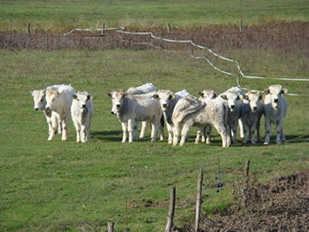
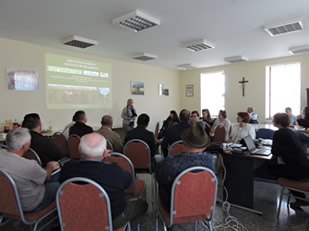 The main goal of the project Last Chance for Podolian Cattle was to protect, preserve and improve the biological diversity on significant landscape Gajna by preserving the critically endangered breeds and practices of traditional grazing on Gajna. Brod Ecological Society- BED has been implementing the project from November 2015 to September 2016. It was funded by the German Foundation Euronatur. The project encouraged and created the basis for economic activity - ecological agriculture, tourism and sustainable development in accordance with ecological principles in the rural area with emphasis on villages in the municipality of Oprisavci. It also activated the mechanisms and groups that helped to create and preserve the conditions of the traditional way of harvesting. The activities we carried out focused on the distribution of offsprings of podolian cattle, eight females, to breeders from Gajna. The project included members of the pasturing community to whome podolian cattle were given without compensation but with the condition that they hold it on Gajni for five years. Two workshops on agri-environmental measures and a roundtable on common pastures were held. Another important activity was to maintain the existing infrastructure needed for grazing and removing invasive species.
The main goal of the project Last Chance for Podolian Cattle was to protect, preserve and improve the biological diversity on significant landscape Gajna by preserving the critically endangered breeds and practices of traditional grazing on Gajna. Brod Ecological Society- BED has been implementing the project from November 2015 to September 2016. It was funded by the German Foundation Euronatur. The project encouraged and created the basis for economic activity - ecological agriculture, tourism and sustainable development in accordance with ecological principles in the rural area with emphasis on villages in the municipality of Oprisavci. It also activated the mechanisms and groups that helped to create and preserve the conditions of the traditional way of harvesting. The activities we carried out focused on the distribution of offsprings of podolian cattle, eight females, to breeders from Gajna. The project included members of the pasturing community to whome podolian cattle were given without compensation but with the condition that they hold it on Gajni for five years. Two workshops on agri-environmental measures and a roundtable on common pastures were held. Another important activity was to maintain the existing infrastructure needed for grazing and removing invasive species.
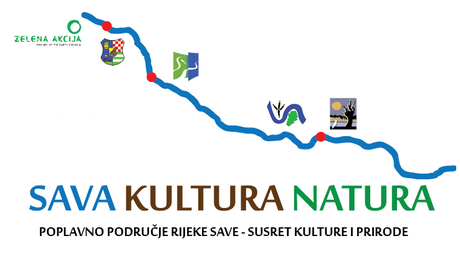 Sava Culture-Nature is one of the six national projects selected for funding by the European Union under the IPA 2011 Pre-Accession Assistance Program - Support to Civil Society Organizations in Developing a Partnership for the Sustainable Use of Protected Areas in Croatia, Including Potential Natura 2000 Areas. The project is co-financed by the Office of the Organizatins of the Republic of Croatia. In the area of floodplains of River Sava such partnership is particularly necessary because many of the natural values of the area are directly dependent on human activities. The lead partner is Green Action from Zagreb, and other partners are: Brod Ecological Society- BED, Public Institution Natura Slavonica, Public Institution Green Ring and Public Institution for the Management of Protected Natural Values of Sisak-Moslavina County. The total value of the project is € 150,000.00 and it will take place in the City of Zagreb, Zagreb, Sisak-Moslavina and Brod-Posavina County for the next 18 months.
The project started on 16th of May 2014. Activities at the previous project team meetings have been launched to bring the ultimate goal - to build the capacities of civil society organizations for co-operation with the public sector in the implementation of activities that nature protection integrates into local sustainable socio-economic development. The project envisages a wide range of activities to analyze the current state of affairs and gives recommendations to policy makers in the field of nature conservation, rural development and river management through specific actions in cooperation with producers in the area to help them better place their products. Coordinatio councils will be established within protected areas so that not only the population concerned with them, but also other participants can contribute to more efficient management. Promotional activities directed at the wider public through materials, exhibitions and Ecofair in Zagreb are also planned. All of this has been accompanied by education of target groups and strengthening of mutual cooperation in the River Sava area.
Sava Culture-Nature is one of the six national projects selected for funding by the European Union under the IPA 2011 Pre-Accession Assistance Program - Support to Civil Society Organizations in Developing a Partnership for the Sustainable Use of Protected Areas in Croatia, Including Potential Natura 2000 Areas. The project is co-financed by the Office of the Organizatins of the Republic of Croatia. In the area of floodplains of River Sava such partnership is particularly necessary because many of the natural values of the area are directly dependent on human activities. The lead partner is Green Action from Zagreb, and other partners are: Brod Ecological Society- BED, Public Institution Natura Slavonica, Public Institution Green Ring and Public Institution for the Management of Protected Natural Values of Sisak-Moslavina County. The total value of the project is € 150,000.00 and it will take place in the City of Zagreb, Zagreb, Sisak-Moslavina and Brod-Posavina County for the next 18 months.
The project started on 16th of May 2014. Activities at the previous project team meetings have been launched to bring the ultimate goal - to build the capacities of civil society organizations for co-operation with the public sector in the implementation of activities that nature protection integrates into local sustainable socio-economic development. The project envisages a wide range of activities to analyze the current state of affairs and gives recommendations to policy makers in the field of nature conservation, rural development and river management through specific actions in cooperation with producers in the area to help them better place their products. Coordinatio councils will be established within protected areas so that not only the population concerned with them, but also other participants can contribute to more efficient management. Promotional activities directed at the wider public through materials, exhibitions and Ecofair in Zagreb are also planned. All of this has been accompanied by education of target groups and strengthening of mutual cooperation in the River Sava area.
više o aktivnostima vezanim za projekt
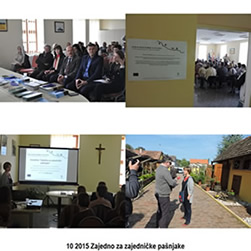 The goals of this smaller project, implemented by the Brod Ecological Society- BED during 2014 and 2015, were few. Through direct action, flood damage was eliminated and mechanisms to adapt old breeds to flooded common pastures were developed. Promotional activities in nearby urban areas have pointed to the values of an extensive pasture and linked producers to consumers. Through roundtables/public hearings with national and local authorities, the awareness was raised and put pressure on them to solve this complex problem and led to the establishment of an alliance for common pastures. The Global Green Fund allowed the survival of breeders of indigenous breeds organized on Gajna community. Since the beginning of 2014, these people have experienced six floods, of which two are almost one-hundred-year-old ones and one-thousand-year-old. Smaller technical solutions to nearby channels in accordance with nature protection rules in most of the territory provided more security and additional time for evacuation in the event of future floods.
The goals of this smaller project, implemented by the Brod Ecological Society- BED during 2014 and 2015, were few. Through direct action, flood damage was eliminated and mechanisms to adapt old breeds to flooded common pastures were developed. Promotional activities in nearby urban areas have pointed to the values of an extensive pasture and linked producers to consumers. Through roundtables/public hearings with national and local authorities, the awareness was raised and put pressure on them to solve this complex problem and led to the establishment of an alliance for common pastures. The Global Green Fund allowed the survival of breeders of indigenous breeds organized on Gajna community. Since the beginning of 2014, these people have experienced six floods, of which two are almost one-hundred-year-old ones and one-thousand-year-old. Smaller technical solutions to nearby channels in accordance with nature protection rules in most of the territory provided more security and additional time for evacuation in the event of future floods.
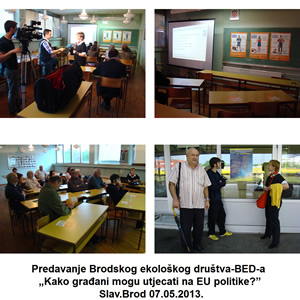 Brod Ecological Society- BED on May 7, 2013 on the premises of Railroad Union in Slavonski Brod organized a lecture on the topic of European Citizens Rights: How Citizens Can Affect EU Policies on EU week in the Brod-Posavina County (BPC). The lecture was held within the project Right to Civil Initiatives - How Can We Influence Public Policies in the EU? and under sponsorship of the Brod-Posavina County Council for European Integration. We spoke about EU citizens' rights with an emphasis on the European civic initiative. The aim of the project was to raise awareness on the rights of European citizens contained in the Treaty on European Union, which complements national law with one of the EU civil rights. Also is is important to better inform citizens of BPC on one of those rights, the civic initiative that enables them to participate directly in the process of creating Public policies.
Brod Ecological Society- BED on May 7, 2013 on the premises of Railroad Union in Slavonski Brod organized a lecture on the topic of European Citizens Rights: How Citizens Can Affect EU Policies on EU week in the Brod-Posavina County (BPC). The lecture was held within the project Right to Civil Initiatives - How Can We Influence Public Policies in the EU? and under sponsorship of the Brod-Posavina County Council for European Integration. We spoke about EU citizens' rights with an emphasis on the European civic initiative. The aim of the project was to raise awareness on the rights of European citizens contained in the Treaty on European Union, which complements national law with one of the EU civil rights. Also is is important to better inform citizens of BPC on one of those rights, the civic initiative that enables them to participate directly in the process of creating Public policies.
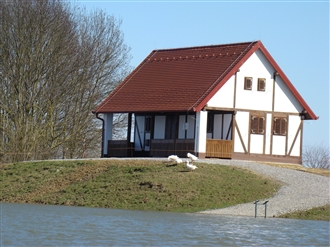 As part of the Nature Protection Investment Project (NPIP), which seeks to provide support in Croatia's preparations for joining the European Union in the nature protection sector - 2012-2013. BED and the Public Institution Natura Slavonica are building "Stan on Gajna", an educational and information center. The apartment was built using the traditional construction method.
As part of the project, an educational trail was created and installed on Gajna.
As part of the Nature Protection Investment Project (NPIP), which seeks to provide support in Croatia's preparations for joining the European Union in the nature protection sector - 2012-2013. BED and the Public Institution Natura Slavonica are building "Stan on Gajna", an educational and information center. The apartment was built using the traditional construction method.
As part of the project, an educational trail was created and installed on Gajna.
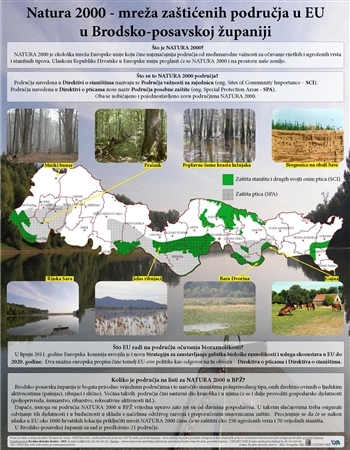 Within the Public Call for Project Proposals to Grant Financial Support for Organizations from means of Brod-Posavina County Council for European Integration, Brod Ecological Society- BED, in 2012, carried out a project Natura 2000 Network of Protected Areas in the EU. Partner on the project was Public Institution Natura Slavonica. In the project the informations about the Natura 2000 ecological network were given to the citizens with emphasis on young people, teachers and professors in primary and secondary schools. Promotional posters with a general knowledge of the network of protected areas in the EU- Natura 2000, about the areas proposed for Natura 2000 in the Brod-Posavina County and basic information on the most important EU-related documents were printed. Residents of Croatia, including those in the Brod-Posavina County, are concerned and uninformed about what means when Croatia enters EU concerning exploit of our natural resources and whether our nature will be protected from economic influences. Therefore, we think it is extremely important to teach citizens about what the EU is doing in this field. It is certainly important to inform citizens about the natural values of our county that are already in the ecological network of the Republic of Croatia.
Within the Public Call for Project Proposals to Grant Financial Support for Organizations from means of Brod-Posavina County Council for European Integration, Brod Ecological Society- BED, in 2012, carried out a project Natura 2000 Network of Protected Areas in the EU. Partner on the project was Public Institution Natura Slavonica. In the project the informations about the Natura 2000 ecological network were given to the citizens with emphasis on young people, teachers and professors in primary and secondary schools. Promotional posters with a general knowledge of the network of protected areas in the EU- Natura 2000, about the areas proposed for Natura 2000 in the Brod-Posavina County and basic information on the most important EU-related documents were printed. Residents of Croatia, including those in the Brod-Posavina County, are concerned and uninformed about what means when Croatia enters EU concerning exploit of our natural resources and whether our nature will be protected from economic influences. Therefore, we think it is extremely important to teach citizens about what the EU is doing in this field. It is certainly important to inform citizens about the natural values of our county that are already in the ecological network of the Republic of Croatia.
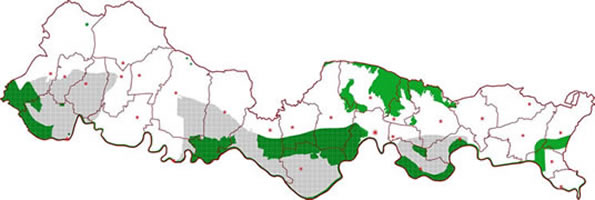
The environmental and nature protection associations Brodsko ekološko društvo-BED from Slavonski Brod and Zelena akcija from Zagreb, in cooperation with the Citizens' Initiative for Clean Air in Slavonski Brod and the Slavonski Brod City Library, organized a public forum "Projects and activities that affect the environment in Slavonski Brod - What and how can citizens do?". The forum was held on September 7, 2012, in the premises of the Slavonski Brod City Library. The public forum was intended for all citizens of Slavonski Brod, with the aim of monitoring the current state of the environment in Slavonski Brod, with a review of the actions and results promised by the bodies at the state and local level in the last year. The forum also presented the experiences of other organizations in monitoring all steps in large energy projects with regard to the announced projects in our county. The panel discussion featured speakers from the Ministry of Environmental and Nature Protection, the city of Slavonski Brod, Brod-Posavina County, the Croatian Institute of Public Health (HZJZ), the State Hydrometeorological Institute, and members of Zelena Akcija and the Citizens' Initiative for Clean Air in Slavonski Brod. On the same day, in the morning, a workshop was held that was open to individuals and members of associations, primarily but not exclusively those active in the field of environmental and nature protection. The workshop offered knowledge and experience in lobbying and advocacy by associations and citizens, offered tools for such activities, and exchanged experiences of working in networks of associations and individuals and their functioning. The workshop continued with a study visit to Slavonski Brod and the significant landscape of Gajna as part of the project "Long-range public policies: land - water - air" which is jointly implemented by the Green Action coordinator and the following partner organizations: Green Osijek, Mountaineering Society Vrlovka, Ecotourism and Brod Ecological Society-BED, and is financed by the National Foundation for Civil Society Development. As part of the study visit, members of the aforementioned organizations, in addition to learning about the work of the Brod Ecological Society-BED, participated in the clean-up campaign of the Sava River bank and the significant landscape of Gajna.
mediji
.jpg) Nositelj: Braniteljska zadruga Eko-Gajna
Nositelj: Braniteljska zadruga Eko-Gajna
Slavonian Syrian Podolian Cattle Carrier: Eco-Gajna Defensive Cooperative
Ministry of Regional Development, Forestry and Water Management BED is in constant contact with other Podolian cattle producers and breeders for the purpose of linking breeders and systematic work at regional and national level. BED is also one of the most active members of the Association of Slavonian-Srijem Podolac Breeders (UUSSP) BED with its project team and continues to assist the Defense Eco Cooperative Gajna, which is joined by farmers from villages surrounding the protected pasture, which we also founded in the CARDS project. BED monitors the entire project administratively and expertly In the PSGO project, the BED project team assists the Eco-cooperative Gajna in the implementation of the project "Creating preconditions for the permanent protection of Podolian cattle". In this project, through artificial insemination, attempts are being made to reach new bullish lines, the lack of which is the main and hitherto unsurpassed problem in the conservation of this critically endangered breed. The BED team hosted a delegation from the Ministry of Regional Development (PSGO Director and 4 staff and a World Bank representative for Croatia as well as a World Bank economics expert). The meetings were hosted by Oprisavci Municipality and attended by the farmers involved in the project. In cooperation with FAO's National Genetic Resources Coordinator Professor Anto Ivankovic from the Faculty of Agriculture, a summary of the professional work entitled: Creating New Bull Lines - a Prerequisite for the Permanent Protection of Slavonian-Srijem Podol Cattle was Reported. (2nd Conference on Native Breeds and Varieties as Part of Natural and Cultural Heritage with International Participation September 22-25, 2010), Poreč, Croatia.

 Donatori: Prekogranični projekt – Alfred Toepfer Foundation F.V.S , DBU (German Federal Environmental Foundation), Michael Otto Stiftung für Umweltschutz, Alfred Toepfer Academy
for Nature Conservation
Donatori: Prekogranični projekt – Alfred Toepfer Foundation F.V.S , DBU (German Federal Environmental Foundation), Michael Otto Stiftung für Umweltschutz, Alfred Toepfer Academy
for Nature Conservation
The project "Fighting invasive plant species" - NNA - As part of the program/education called "Sustainable nature conservation and regional development in floodplains and wetlands of the Danube basin", one cross-border project is also financed - "Fight against invasive plant species" which is carried out from November 2010 to May 2011. The project was carried out with the expert assistance of the State Institute for Nature Protection, the county institution for the management of protected natural values and is of a cross-border character. As part of the project, BED together with the Provincial Institute for Nature Protection of Vojvodina and with colleagues from Obedska bara (which is on the Sava river), prepared a joint brochure on invasive plant species and the fight against them in the area of the Sava river basin. Every three weeks, monitoring was carried out on the test fields in Gajna. Tarupiran dio određen za proljeće. With partners from the Institute for Nature Protection of Vojvodina, a joint informational and educational leaflet on invasive plant species in the Sava River area was created.
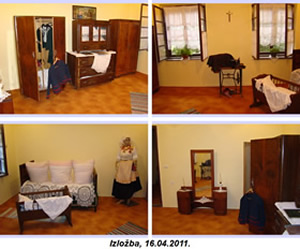
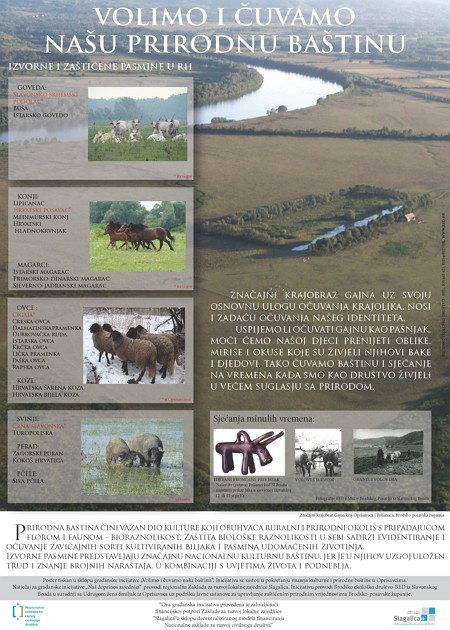 Regional Foundation for Civil Society Development "Slagalica", The museum of cultural and natural heritage in the village of Oprisavci near Gajna, Brod Ecological Society-BED from Slavonski Brod and the Women's Association Smiljak from Oprisavci, as part of the civic initiative "Our Contribution to the Community" of the regional Foundation for Local Community Development, are implementing the initiative "We Love and Preserve Our Heritage".
The initiative consists of launching a museum of cultural and natural heritage in Oprisavci. The activities include the renovation of the space in an old home, the collection and inventory of old objects for permanent and temporary exhibitions, and the activation of the population in the community. The general goal was to preserve the cultural and natural heritage of the rural area in the municipality of Oprisavci, and the specific goal was to create prerequisites for a locally led initiative of collecting cultural heritage objects and displaying existing natural heritage, the possibility of permanent and temporary exhibitions of cultural and natural heritage, and the activation of the population in generally beneficial actions. As part of the project, BED organized an exhibition of natural heritage within the space and printed a poster related to local values and native and protected breeds.
Regional Foundation for Civil Society Development "Slagalica", The museum of cultural and natural heritage in the village of Oprisavci near Gajna, Brod Ecological Society-BED from Slavonski Brod and the Women's Association Smiljak from Oprisavci, as part of the civic initiative "Our Contribution to the Community" of the regional Foundation for Local Community Development, are implementing the initiative "We Love and Preserve Our Heritage".
The initiative consists of launching a museum of cultural and natural heritage in Oprisavci. The activities include the renovation of the space in an old home, the collection and inventory of old objects for permanent and temporary exhibitions, and the activation of the population in the community. The general goal was to preserve the cultural and natural heritage of the rural area in the municipality of Oprisavci, and the specific goal was to create prerequisites for a locally led initiative of collecting cultural heritage objects and displaying existing natural heritage, the possibility of permanent and temporary exhibitions of cultural and natural heritage, and the activation of the population in generally beneficial actions. As part of the project, BED organized an exhibition of natural heritage within the space and printed a poster related to local values and native and protected breeds.
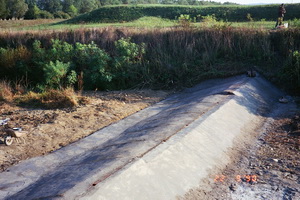 Donor: Hrvatske vode.
Donor: Hrvatske vode.
Croatian Waters fully financed two projects designed by BED to protect biodiversity on the Gajna River threatened by climate extremes (PPP as a place of refuge for animals during floods, rehabilitation of a 22-year-old dam as a means of bringing water to ponds during droughts)
 2007-2009 – u sklopu . "ZAŠTITA, OČUVANJE I POBOLJŠANJE BIOLOŠKE RAZNOLIKOSTI I RAZVOJ EKOLOŠKE SVIJESTI KROZ UZGOJ HRVATSKIH AUTOHTONIH PASMINA I POTICAJ EKOLOŠKE PROIZVODNJE"
– gradnja protupoplavnog platoa kao buduće lokacije stana na Gajni
2007-2009 – u sklopu . "ZAŠTITA, OČUVANJE I POBOLJŠANJE BIOLOŠKE RAZNOLIKOSTI I RAZVOJ EKOLOŠKE SVIJESTI KROZ UZGOJ HRVATSKIH AUTOHTONIH PASMINA I POTICAJ EKOLOŠKE PROIZVODNJE"
– gradnja protupoplavnog platoa kao buduće lokacije stana na Gajni
2007 - "POTPORA ZA TRADICIJSKU GRADNJU ŠTALE NA GAJNI I NABAVU MATERIJALA ZA TZV. "STAN" (SALAŠ) NA GAJNI" – izrada temelja
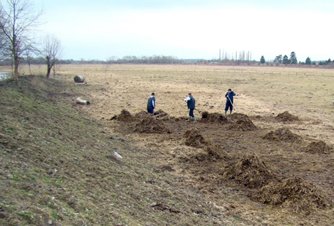 Brod Ecological Society- BED in 2009 started with the project Waste Disposal Through Composting to Preserve Biodiversity on the Protected Pasture Gajna (Eco-compost) financed by the Ministry of Environmental Protection and Spatial Planning. In the project it is foreseen natural waste disposal through composting from a protected pasture on which the cattle is bred in the biodiversity conservation project. A brochure, which is educating about ways of disposing of natural waste through composting, is printed to be distributed in the schools and municipalities of Brod-Posavina County and NGOs. In a previous project funded by the EU, on the pasture Gajna podolian cattle has been brought to preserve autochthonousness and biodiversity, which by grazing and stomping prevents the development of invasive plants. Cattle remains outdoor in the winter in a restricted area and creates a problem of natural waste that could endanger the development of indigenous flora and fauna of pasture. By composting, which would also use other natural wastes from the pastures created by mechanically removing invasive woody plants, it would create humus of exceptional quality. The end product is particularly valuable because it is from ecological production and extensive breeding that does not use any chemicals or nutritional supplements. The overall objective of the project is to educate the rural population by providing examples of how to manage natural waste (agricultural and forestry) with moderate costs and convert it into a highly valuable product for further plant production. Specific objectives of the project are: preservation of biodiversity in the protected landscape Gajna through the removal of natural waste through composting; printing a promotional brochure that would provide the rural population and school children with basic information on the possibility of disposing and re-using natural waste; spreading environmental awareness and support to institutions; to be active and activate others in areas of special state concern in sustainable development projects.
Brod Ecological Society- BED in 2009 started with the project Waste Disposal Through Composting to Preserve Biodiversity on the Protected Pasture Gajna (Eco-compost) financed by the Ministry of Environmental Protection and Spatial Planning. In the project it is foreseen natural waste disposal through composting from a protected pasture on which the cattle is bred in the biodiversity conservation project. A brochure, which is educating about ways of disposing of natural waste through composting, is printed to be distributed in the schools and municipalities of Brod-Posavina County and NGOs. In a previous project funded by the EU, on the pasture Gajna podolian cattle has been brought to preserve autochthonousness and biodiversity, which by grazing and stomping prevents the development of invasive plants. Cattle remains outdoor in the winter in a restricted area and creates a problem of natural waste that could endanger the development of indigenous flora and fauna of pasture. By composting, which would also use other natural wastes from the pastures created by mechanically removing invasive woody plants, it would create humus of exceptional quality. The end product is particularly valuable because it is from ecological production and extensive breeding that does not use any chemicals or nutritional supplements. The overall objective of the project is to educate the rural population by providing examples of how to manage natural waste (agricultural and forestry) with moderate costs and convert it into a highly valuable product for further plant production. Specific objectives of the project are: preservation of biodiversity in the protected landscape Gajna through the removal of natural waste through composting; printing a promotional brochure that would provide the rural population and school children with basic information on the possibility of disposing and re-using natural waste; spreading environmental awareness and support to institutions; to be active and activate others in areas of special state concern in sustainable development projects.
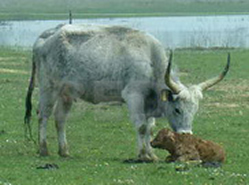 At the end of 2008, BED successfully completed the project "Protecting, Preserving and Improving Biodiversity and Developing Ecological Awareness through Breeding Croatian Indigenous Breeds and Encouraging Organic Production". The project was funded by EU funds through the CARDS 2004 program and lasted 18 months. The project focuses on the protected landscape of Gajna in the eastern part of Brod-Posavina County in the Sava River floodplain. The project encourages and provides conditions for economic activity and ensures sustainable development in accordance with ecological principles in rural parts of Croatia with the main focus on villages in the municipality of Oprisavci.
At the end of 2008, BED successfully completed the project "Protecting, Preserving and Improving Biodiversity and Developing Ecological Awareness through Breeding Croatian Indigenous Breeds and Encouraging Organic Production". The project was funded by EU funds through the CARDS 2004 program and lasted 18 months. The project focuses on the protected landscape of Gajna in the eastern part of Brod-Posavina County in the Sava River floodplain. The project encourages and provides conditions for economic activity and ensures sustainable development in accordance with ecological principles in rural parts of Croatia with the main focus on villages in the municipality of Oprisavci.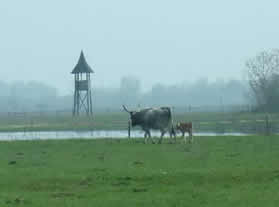 A further goal of the project is to be active and to activate other mechanisms / groups that will help to create and maintain the conditions of the traditional grazing method, urgently needed to conserve endangered native species and landscapes. The basic idea of the project is to combine the economically viable organic breeding of Podolian cattle, Posavina horse and black Slavonian pig in the Gajna pasture, which would create conditions for the functioning of the eco - cooperative with the help of which would encourage sustainable development in the area of special national concern. Indigenous plant species would be protected through free grazing and the production of healthy food would be encouraged, while breeding the pond and creating a hill would create the conditions for controlled eco-tourism. County, which through the results of the project accepts eco-production as one of the conditions for sustainable development and raises environmental awareness and creates the conditions for eco-tourism through accompanying projects (tracing of cycling and riding trails through protected areas of the county).
A further goal of the project is to be active and to activate other mechanisms / groups that will help to create and maintain the conditions of the traditional grazing method, urgently needed to conserve endangered native species and landscapes. The basic idea of the project is to combine the economically viable organic breeding of Podolian cattle, Posavina horse and black Slavonian pig in the Gajna pasture, which would create conditions for the functioning of the eco - cooperative with the help of which would encourage sustainable development in the area of special national concern. Indigenous plant species would be protected through free grazing and the production of healthy food would be encouraged, while breeding the pond and creating a hill would create the conditions for controlled eco-tourism. County, which through the results of the project accepts eco-production as one of the conditions for sustainable development and raises environmental awareness and creates the conditions for eco-tourism through accompanying projects (tracing of cycling and riding trails through protected areas of the county).
MEDIA ABOUT CARDS 2004 PROJECT
First LIFE Third Countries Participant Meeting / SDC Project Conservation of the Biological Diversity of the Sava River Basin in the Ramsar Wetland of Bardaca (BiH); BED presentation of the CARDS project - 24/09/07
Native Species Conference as a Part of National and Cultural Heritage of International Character in Sibenik - CARDS Project Presentation - 13-16 / 11/07
Esther Koopmanschap CARDS Project Presentation from Waggingen (Netherlands) - IUCN (World Conservation Union) - visit to Gajna -29/10/07
Project information posted in BED information showcase at Slavonski Brod train station - November 2007 and (regularly updated)
Articles on BED and CARDS project published in IUCN (World conservation Union) magazine "Life on the Sava" - December 2007 ( more )
Placing a wooden project information board on the Gajna pasture itself - 01/12/07
Public presentation at a press conference by Public Institutions for the Management of Protected Areas of Nature (Project Partner); CARDS project presented to local media (SB TV, print media (Voice of Slavonia, Brod Posavina, Vjesnik, Večernji list, radio, web portals) - 19/12/07
The project manager gave interviews to local radio stations (Radio Slavonia and Radio Brod) on three occasions - January and twice in February 2008.
Bulletin of the Croatian National Tourist Board (HTZ) - March 2008 - Article - "Guardian Animals of Tradition and Landscape" (HTZ electronic newsletter is distributed at 1200 e-mail addresses)( više )
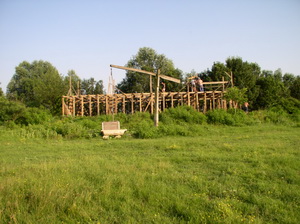
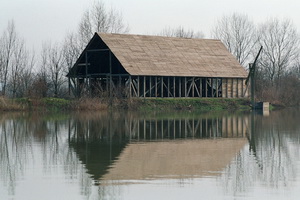 The material was procured through several smaller projects over the course of three years, and the construction work was mostly voluntary and about 20 people participated. "Support for the traditional construction of a barn on Gajna and the procurement of materials for the so-called "flat" (farmhouse) on Gajna" from the Ministry of the Sea, Tourism, Transport and Development "Barn on Gajna" - co-financed by the Tourist Board of Oprisavci municipality "Construction of a barn on Gajna using a traditional construction method for the purpose of growing Croatian original breeds in order to preserve biological diversity". The project was financed based on the conclusion of the Government of the Republic of Croatia at the expense of the State Budget. BED concluded a financial support contract with the Ministry of Environmental Protection and Spatial Planning.
The material was procured through several smaller projects over the course of three years, and the construction work was mostly voluntary and about 20 people participated. "Support for the traditional construction of a barn on Gajna and the procurement of materials for the so-called "flat" (farmhouse) on Gajna" from the Ministry of the Sea, Tourism, Transport and Development "Barn on Gajna" - co-financed by the Tourist Board of Oprisavci municipality "Construction of a barn on Gajna using a traditional construction method for the purpose of growing Croatian original breeds in order to preserve biological diversity". The project was financed based on the conclusion of the Government of the Republic of Croatia at the expense of the State Budget. BED concluded a financial support contract with the Ministry of Environmental Protection and Spatial Planning.
sufinancirale Hrvatske vode Partner - Državni zavod za zaštitu prirode Zagreb.
This project received support within the (DRP) Danube Regional Project, which is implemented by The Regional Environmental Center for Central and Eastern Europe (REC) for UNDP-GEF (UN Development Program - global Environment Facility)». Our partner in the project was (CTR d.o.o.) Technology Development Centre.
Published by the Tourist Board of Brod-Posavina County and the Brod Ecological Society.
Izdavač Turistička zajednica županije Brodsko-posavske i Brodsko ekološko društvo.
.jpg)
.jpg) Ovaj projekt dobio je potporu u okviru (DRP) Danube Regional Project kojeg provodi The Regional Environmental Center for Central and Eastern Europe (REC) za UNDP-GEF (UN Development Program- global Enviroment Facility)». Partner u projektu bio nam je (CTR d.o.o.) Tehnology Development Centre.
Ovaj projekt dobio je potporu u okviru (DRP) Danube Regional Project kojeg provodi The Regional Environmental Center for Central and Eastern Europe (REC) za UNDP-GEF (UN Development Program- global Enviroment Facility)». Partner u projektu bio nam je (CTR d.o.o.) Tehnology Development Centre.
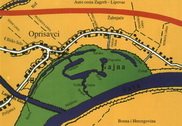 1996. Institut otvoreno društvo-Hrvatska financiralo je TISKANJE POUČNE STAZE GAJNA. Knjižica je tiskana na hrvatskom jeziku 800 primjeraka i po 100 na njemačkom i engleskom jeziku. 1998. god. TISKANA NOVA KNJIŽICA „POUČNA STAZA GAJNE“. Izdavač Brodsko ekološko društvo-Turistička zajednica županije Brodsko posavske-Turistička zajednica općine Oprisavci – donator - Regionalni centar zaštite okoliša za srednju i istočnu Europu.
1996. Institut otvoreno društvo-Hrvatska financiralo je TISKANJE POUČNE STAZE GAJNA. Knjižica je tiskana na hrvatskom jeziku 800 primjeraka i po 100 na njemačkom i engleskom jeziku. 1998. god. TISKANA NOVA KNJIŽICA „POUČNA STAZA GAJNE“. Izdavač Brodsko ekološko društvo-Turistička zajednica županije Brodsko posavske-Turistička zajednica općine Oprisavci – donator - Regionalni centar zaštite okoliša za srednju i istočnu Europu.
Regionalni centar zaštite okoliša za srednju i istočnu Europu - REC finacirao je projekt „ZAŠTITA SLIVA ZAPADNOG LATERALNOG KANALA „ Analizirana je voda sliva ZLK i utvrđena sadašnja i potencionalno moguća zagađenja . Uspostavljena je veza sa lokalnim upravama i skrenuta pozornost važnosti čistoće ZLK, jer se vode ZLK mogu upuštati u bare Gajne.
MEDJUNARODNO ČIŠĆENJE OBALA (INTERNATIONAL COASTAL CLEANUP) organizirano na Gajni (tipični poplavni prisavski pašnjak kraj sela Oprisavci) 1995., 1997. i 1999. te na obalama rijeke Save u Slavonskom Brodu 1996. i 2000.
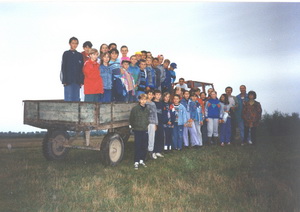
Projekt je financiran od Regionalnog centara za zaštitu okoliša za Srednju i Istočnu Europu.
U osnovnoj školi u Oprisavcima organizirana i opremljena EKO VITRINA sa namjerom da se školska djeca upoznaju sa njihovim zaštićenim krajobrazom Gajna.
.jpg)
.jpg)
.jpg)
Brod Ecological Society - BED with its own means, and with the big donation of the company Montaž Đuro Đaković and with smaller donations of various companies started building a dam on the Lateral Channel. The altitude of the bottom of the Lateral Channel and the height of the possible exit of the water from ponds on Gajna were measured geodeticly. It was found that with the dam of 120 cm in the channel, the water from Lateral Channel can be fed into the Gajne ponds. The final works on dam were until September 23rd, 1990.
With the help of the volunteer and the JNA in 1988, the pond Velika Gajna was dredged and fenced. The pond was dredged to increase the level of water in it that is beneficial to biodiversity. The seedlings of ash tree were planted in freshly dredged soil. At that time, between 150 and 200 cows came to Gajna, and the seedlings had to be physically isolated so that the cows would not eat them.